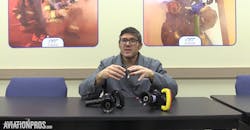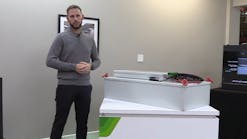Patients undergoing treatment with radioisotopes can trigger security alarms at places like airports for up to three months, experts said today.
British researchers followed the case of a 46-year-old man who set off alarms at Orlando airport in Florida, six weeks after treatment.
He was detained, strip-searched and sniffer dogs were brought in.
Writing in today's British Medical Journal (BMJ), researchers suggest that doctors need to do more to make patients aware that they are radioactive for up to 95 days after treatment.
The researchers said of the man: "A prolonged period of interrogation ensued. Luckily, he was carrying his radionuclide (his treatment) card with him. He was finally released after a long delay and much embarrassment."
The man had been treated with radioiodine for the thyroid condition thyrotoxicosis.
The researchers said radioiodine could stay in the system for a long time and around 10,000 patients in the UK receive it every year for thyroid problems.
Other radioisotopes, such as those used in bone scans, heart scans, and iodine uptake scans, should leave the system after a few days.
The researchers found a further four examples where people had triggered alarms - including two patients who entered the White House for a public tour.
Another man triggered the security alarm at his bank.
Dr Kalyan Kumar Gangopadhyay, specialist registrar in diabetes and endocrinology at City Hospital, Birmingham, who led the study, said treatment cards in the US now carried a warning but more needed to be done to alert UK patients.
He said: ``Security alarms have been made more sensitive and people are going to come across these problems more and more.
``We want everybody to know about this, as airports are deploying more sensitive radiation detection systems to combat terrorism.''
Dr Gangopadhyay said doctors should advise patients who are about to receive radioisotopes to take their radiation certificates when flying.
An accompanying BMJ editorial said patients who have undergone recent treatment should avoid close contact with other people and should not to try to conceive for up to 12 months.
Dr Gangopadhyay said the Royal College of Physicians should include a warning on security scans in its guidance on the treatment of thyroid conditions.
Copyright 2005 LexisNexis, a division of Reed Elsevier Inc. All rights reserved.
Terms and Conditions | Privacy Policy
News stories provided by third parties are not edited by "Site Publication" staff. For suggestions and comments, please click the Contact link at the bottom of this page.





